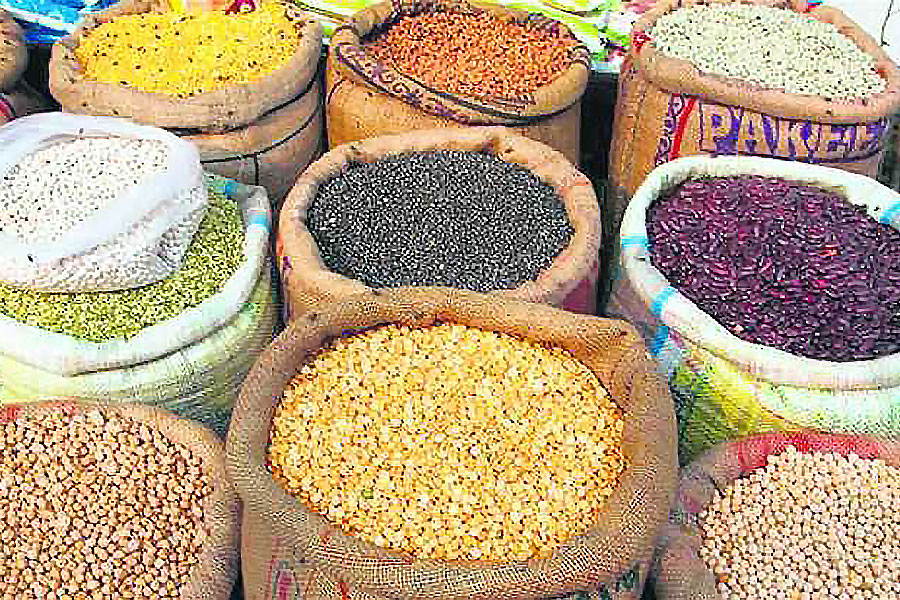
Fortune News | Nov 16,2019
Oct 22 , 2022.
Suppose one policy move can reveal the degree to which Ethiopia’s economy is in the chasms of disquiet. In that case, hardly any matches the measure federal authorities took last week capping imports of goods.
The State Minister for Finance, Semereta Sewasew, has gained a reputation in brusque, signing a letter to the central bank, announcing that hundreds of items under 38 categories should not be allocated with foreign currency - indefinitely. Her bosses were in Washington D.C., pushing for external debt restructuring with the IMF Board. It was an exercise in futility, with an outcome described by Eyob Tekalegn (PhD), state minister for Finance, as nothing but “disappointing.”
Central bank’s Governor, Yinager Dessie (PhD), too, was in Washington when his deputies followed up on their colleagues’ decision at the Finance Ministry, putting a lid on the letters of credit on the items. It was a jaw-dropping moment for many. Outright and formal discrimination against imports appears to be an alien concept for the post-1991 generation. For older denizens, it is undoubtedly a spell from the past. It is a familiar episode of an era when a national economy was besieged by scarcity and deprivation.
The ban may look necessary as a temporary policy response. It may be understood as an opportunity for domestic manufacturers to fill in the gap imports leave behind. However, it may harm domestic producers, undermining their competitive urge and condoning poor quality in production. Consumers would be the most disadvantaged, disconnected from the international market and fall prey to the mediocrity of domestic manufacturers. Judging by historical records, domestic producers sheltered by policy protection can only take consumers for granted.
The ultimate objective of public policy should be to help consumers get value for money that is of high standards, quality, and efficiency. This comes better from policies designed to encourage productivity growth and enhanced competition of domestic and international nature.
How did policymakers and the economy they stir through reach such a bottom pit?
In the absence of their political bosses, the deputies at the central bank and the Finance Ministry tried to justify the restriction. Goods from chewing gums, cigarettes and perfume to packed foods, furniture, cars and human hair are not as vital to the economy as fuel, fertilizer and industrial inputs. They hope to see, against all odds, the indefinite cupping of forex on the selected items to stabilize the exchange market.
The question that needs to be addressed is instead, “why now?”
The revelation from Washington D.C. in the week the authorities imposed an embargo ought to have been alarming. IMF’s annual reports on countries’ macroeconomic performance disclosed that Ethiopia has a foreign currency reserve of only enough to pay for 20-day imports.
Estimated to hover between 700 million and 800 million dollars, this amount puts Ethiopia in the rows of South Sudan and Malawi in sub-Sahara Africa. The last time the country was as much broke in forex terms was in May 1991, when the military-Marxist regime was defeated but with a forex reserve sufficient for 28-day imports. Then as now, the economy was plummeting under a devastating civil war. The IMF’s projection gives little solace. Next year, the forex reserve will further erode, down to less than 20-day imports.
The authorities’ rationale for taking such an unprecedented move may appear reasonable on the surface. But for any curious observer of trends in the macroeconomy, what they desperately aim for could be to narrow the growing gap in exchange rates between the official and parallel markets. They were right to get horrified after seeing the Dollar’s value against the Birr in the parallel market exceed 100, surpassing the official rate by more than double.
The authorities may blame businesspeople's abuse and misuse of the franco valuta regime and the highly volatile and speculative car market. Many of the items included in the embargo could be collateral damages of a policy decision that targeted vehicle importers, many of whom often depend on the exchange parallel market to stay in business. The hope is that a blanket ban on all but electric cars will dampen the demand for forex in the parallel market, giving breathing time for Birr to recover.
It is a respite move, if not symbolic.
Symbolic because all the items listed in the embargo have no significant impact either on the import bills or their volume. Tracking the three-year average beginning in 2018 shows that their average import value has been 600 million dollars, constituting five percent of total imports during this period. On the contrary, importing fuel costs Ethiopia over four billion dollars, consuming almost all the revenues it received last year from exports.
It is also a measure of respite because such a knee-jerk approach hardly holds the value of the Birr against a basket of major currencies. The erosion of the Birr is one manifestation of more profound crises that ails the economy. Troubles in the balance of payments, inflation caused by the ballooning budget deficit, and external debt servicing form the axis of crisis that beleaguer the national economy. The response should be strategic in outlook and deliberative in its process.
Part of the crisis in the balance of payments comes from considerable drops in foreign direct investments and official loans and grants from bilateral and multilateral sources.
There is not much the economy can show as noticeable foreign investments, but telecom licensing granted to Safaricom-Ethiopia, an international consortium. The net inflow of foreign direct investment has been declining for years now, from over four billion dollars in 2016 to less than a billion dollars this year. The same is true for official loans and grants that plummeted from over four billion dollars in 2018 to less than 300 million dollars in four years.
In the absence of an agreement with major creditors on debt treatment, macroeconomic policymakers eye the risk of default. A country which defaulted on its international obligations would have its population suffer from forced austerity measures and depreciation of its currency. The risk of asset seizures is a lesson a country could take from the debacle of Argentine.
The federal government appears to have been locked in a hapless situation where it wants to make its way out of fiscal deficit by selling massive volumes of treasury bills (short-term instruments) and central bank lending, in effect, printing money. This can only exacerbate the inflationary pressure in the economy, assaulting consumers’ purchasing power.
Given the significant role of these fundamental drivers, the appropriate response should be to deal with the crux of the crisis. Whether to resume talks on debt restructuring, encourage foreign direct investments or beef up external loans and grants, nothing much seems to appear to move if the country is mired in wars. A war-footing economy can only consume its productive resources.
Bringing the civil war and the militarised conflicts in many parts of the country to an end through negotiated political settlements is vital to move the economy forward. Ethiopia’s economy may have had two occasions in half a century where the balance of payments was positive. However, in the words of former Finance Minister Sufian Ahmed, the forex crisis is deeply structural, and the resolutions would not come in his lifetime. But it is the ongoing wars and conflicts that worsened the imbalance. Coming to terms with this truth could help rather than spending a lot of time, focus and energy treating the symptoms.
PUBLISHED ON
Oct 22,2022 [ VOL
23 , NO
1173]

Fortune News | Nov 16,2019

Fortune News | Aug 06,2022

Fortune News | Nov 18,2023

Radar | Aug 21,2023

Fortune News | Aug 13,2022

Radar | Sep 02,2023

Radar | Mar 26,2022

Fortune News | Dec 04,2021

Radar | Jul 31,2021

Fortune News | Mar 19,2022

Photo Gallery | 173932 Views | May 06,2019

Photo Gallery | 164158 Views | Apr 26,2019

Photo Gallery | 154245 Views | Oct 06,2021

My Opinion | 136601 Views | Aug 14,2021

Dec 22 , 2024 . By TIZITA SHEWAFERAW
Charged with transforming colossal state-owned enterprises into modern and competitiv...

Aug 18 , 2024 . By AKSAH ITALO
Although predictable Yonas Zerihun's job in the ride-hailing service is not immune to...

Jul 28 , 2024 . By TIZITA SHEWAFERAW
Unhabitual, perhaps too many, Samuel Gebreyohannes, 38, used to occasionally enjoy a couple of beers at breakfast. However, he recently swit...

Jul 13 , 2024 . By AKSAH ITALO
Investors who rely on tractors, trucks, and field vehicles for commuting, transporting commodities, and f...

Oct 12 , 2025
Tomato prices in Addis Abeba have surged to unprecedented levels, with retail stands charging between 85 Br and 140 Br a kilo, nearly triple...

Oct 12 , 2025 . By BEZAWIT HULUAGER
A sweeping change in the vehicle licensing system has tilted the scales in favour of electric vehicle (EV...

Oct 12 , 2025 . By NAHOM AYELE
A simmering dispute between the legal profession and the federal government is nearing a breaking point,...

Oct 12 , 2025 . By NAHOM AYELE
A violent storm that ripped through the flower belt of Bishoftu (Debreziet), 45Km east of the capital, in...